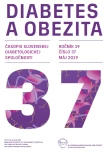-
Medical journals
- Career
A way from EBM to the latest consensus report by the ADA and EASD: management of hyperglycaemia in T2DM, 2018
Authors: Zbynek Schroner 1; Vladimír Uličiansky 2
Authors‘ workplace: SchronerMed, s. r. o., Košice 1; Via medica, s. r. o., Košice 2
Published in: Diab Obez 2019; 19(37): 39-43
Category: Guidelines
Overview
Evidence-based medicine allows the integration of the best available research evidence with clinical expertise and patient values. Guidelines present relevant evidence to help physicians weigh the benefits and risks of a particular diagnostic or therapeutic procedure. They should be essential in everyday clinical decision making. A consensus report by the American Diabetes Association (ADA) and the European Association for the Study of Diabetes (EASD) (2018) addresses the approaches to management of glycaemia in adults with type 2 diabetes, with the goal of reducing complications and maintaining quality of life in the context of cardiovascular risk management and patient-centred care. Key messages: optimalisation of lifestyle; the selection of medication added to metformin is based on – patient preference and clinical characteristics, including presence of cardiovascular disease, heart failure and kidney disease. The risk for specific adverse medication effects, particularly hypoglycaemia and weight gain; as well as safety, tolerability, and cost, are also important considerations.
Received 28. 3. 2019
Accepted 6. 5. 2019
Keywords:
consensus report ADA EASD 2018 – evidence based medicine EBM – guidelines
Sources
- Uličiansky V, Lazúr I. Rozhodovací algoritmus v klinickej praxi. Vnútorný dialóg lekára. Vnitř Lék 1985; 31(4): 391–397.
- Rawlins M. Therapeutics, evidence and decision-making. CRC Press (Hodder Arnold): London 2011. ISBN 13–978–1-85315947–3.
- Uličiansky V. Liečba diabetes mellitus v zrelom veku. In: Uličiansky V, Schroner Z, Galajda et al. Diabetes mellitus v zrelom veku. Quick Print: Martin 2013 : 16–92. ISBN 978–80–971417–1-4.
- Cefalu WT, Kaul S, Gerstein HC et al. Cardiovascular Outcomes Trials in Type 2 Diabetes: Where Do We Go From Here? Reflections From a Diabetes Care Editors´Expert Forum. Diabetes Care 2018; 41(1):14–31. Dostupné z DOI: <http://dx.doi.org/10.2337/dci17–0057>.
- Martinka M, Uličiansky BV, Mokáň M et al. Konsenzuálne terapeutické odporúčanie Slovenskej diabetologickej spoločnost pre diabetes mellitus 2. typu (2018). [A consensual therapeutic recommendation for type 2 diabetes mellitus by the Slovak Diabetes Society (2018)]. Forum Diab 2018; 7(1): 47–68.
- Davies MJ, D’Alessio DA, Fradkin J et al. Management of hyperglycemia in type 2 diabetes, 2018. A consensus report by the American Diabetes Association and the European Association for the Study of Diabetes. Diabetologia 2018; 41(12): 2669–2701. Dostupné z DOI: <http://dx.doi.org/10.2337/dci18–0033>.
- Inzuchi SE, Bergenstal RM, Buse JB et al. Management of hyperglycemia in type 2 diabetes: a patient-centered approach. Position statement of the American Diabetes Association and the European Association for the Study of Diabetes. Diabetes Care 2012; 35(6): 1364–1379. Dostupné z DOI: <https://doi.org/10.2337/dc12–0413>.
- Inzuchi SE, Bergenstal RM, Buse JB et al. Management of hyperglycemia in type 2 diabetes, 2015: a patient-centered approach: update to a position statement of the American Diabetes Association and the European Association for the Study of Diabetes. Diabetes Care 2015; 38(1): 140–149. Dostupné z DOI: <http://dx.doi.org/10.2337/dc14–2441>.
- Haluzík M, Schroner Z. Liečba založená na účinku inkretínov a kardiovaskulárne riziko. In: Schroner Z, Haluzík M, Mráz M et al. Antidiabetiká a kardiovaskulárne riziko. Typopress: Košice-Myslava 2017 : 97 - 116 .ISBN 978–80–8129–073–2.
- Patorno E, Pawar A, Franklin J et al. Empagliflozin and the risk of heart failure hospitalization in routine clinical care: A first analysis from the empagliflozin comparative effectiveness and safety (EMPRISE) study. AHA 2018. Circulation 2018; 138(Suppl 1): A14741 (poster 1112).
Labels
Diabetology Obesitology
Article was published inDiabetes and obesity

2019 Issue 37-
All articles in this issue
- Familial hypercholesterolemia and project MedPed FH
- DNA diagnostics of the most common forms of monogenic diabetes in Slovakia
- Hypoglycaemia in diabetes mellitus
- New technologies in diabetology of continuous monitoring – new options in the treatment of diabetes mellitus
- Anti-inflammatory treatment reduces atherothrombotic risks
- A way from EBM to the latest consensus report by the ADA and EASD: management of hyperglycaemia in T2DM, 2018
- Metformin in patients with chronic kidney disease and cardiovascular disease
- 50 rokov Slovenskej diabetologickej spoločnosti
- Odišiel MUDr. Peter Pavlov, MPH (*8. 6. 1962 – †19. 4. 2019)
- Diabetes and obesity
- Journal archive
- Current issue
- Online only
- About the journal
Most read in this issue- 50 rokov Slovenskej diabetologickej spoločnosti
- Hypoglycaemia in diabetes mellitus
- Odišiel MUDr. Peter Pavlov, MPH (*8. 6. 1962 – †19. 4. 2019)
- Metformin in patients with chronic kidney disease and cardiovascular disease
Login#ADS_BOTTOM_SCRIPTS#Forgotten passwordEnter the email address that you registered with. We will send you instructions on how to set a new password.
- Career

